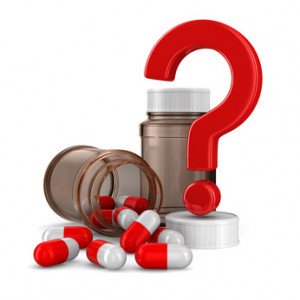
Take the necessary precautions and be informed to help protect yourself in the event of an emergency.
A June 2013 research study, conducted by the Mayo Clinic, revealed that 7 out of 10 Americans take at least one prescription medication. In fact, more than 50 percent of Americans take two prescription drugs, and 20 percent take at least five different medicines. The Center for Disease Control reports that the number of medications a person takes tends to increase with age.
Their most recent study, conducted in 2007-2008, shows that 76 percent of Americans aged 60 and over take 2 or more prescription medications, with 37 percent taking 5 or more medicines. For older Americans, the most common prescriptions are cholesterol lowering drugs, diuretics and beta-blockers (used to treat high blood pressure and heart problems), and antidepressants.
If you take any medications, you know they have been prescribed to you to help keep you healthy and maintain a higher quality of life, and perhaps even longer life. Therefore, it is important that you know some basic facts about the proper medicine storage and safe disposal of your medication. Unfortunately, if you store medications improperly, you run the risk of reducing their potency and effectiveness. In some cases, improperly stored medications can even pose serious risks to your health and safety.
Safe Medicine Storage Tips:
- Always ask your pharmacist about the storage instructions specified by the manufacturer of each of your medications.
- Keep your medications in their original containers, which should have a label with the medication name, instructions for use, and expiration date.
- Keep all medication containers out of reach of children, even if they have safety caps.
- Do not store your medicine in a place where it will be exposed to heat, light, or moisture, as they can all cause the medicine to deteriorate. This means that in some cases, your bathroom medicine cabinet may not be the best choice for storage.
- If your medication must be stored in the refrigerator, make sure to keep it separated from food.
Most importantly, you should dispose of any medications which have expired or unused medicine you do not plan to take. When doing so, you should never flush your medication down the toilet. Most people are not aware that waste water treatment plants cannot remove all traces of chemicals, resulting from pharmaceuticals introduced to the water supply. As a result, these chemicals will end up contaminating local water and perhaps doing harm to aquatic life.
How to Properly Dispose of Your Medication
First, you should check with your pharmacy to see if they have a disposal of prescription medications program or look up medicine take back programs in your area. If not, your best bet is remove the prescription from its original medicine bottle, place it in another sealable container mixed with something like coffee grounds or kitty litter, and place it in the trash. According to the Food and Drug Administration, this will help to keep children, pets, and people seeking drugs, from easily finding them. The FDA also recommends scratching out all personal information before you dispose of your prescription bottles. Also, remember to never give your prescription medicine to someone else. Prescriptions are prescribed specifically to one person and should never be shared.
Some medical alert device companies offer medication management. Read our Lifeline reviews to find a good option for you.


